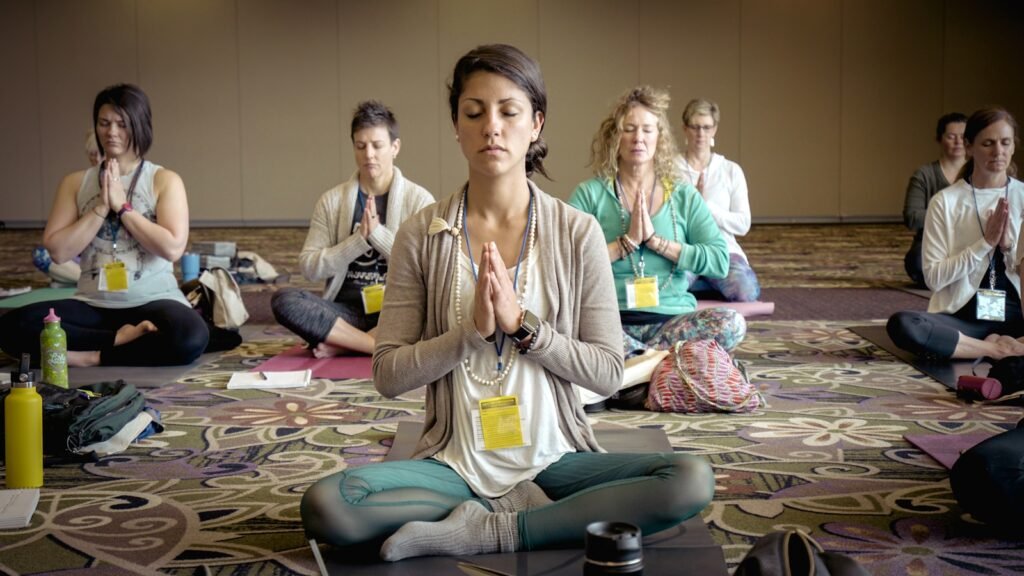Can Christians practice yoga without losing their faith? This question is a big debate among believers. Many wonder if yoga’s Eastern roots clash with Christian values. Yoga is known for its physical benefits like better flexibility and pain relief.
But, the spiritual side of yoga worries some Christians. Looking into how Christians view yoga shows a complex area. It’s a place where careful thought and reflection are key for those thinking about yoga.
Understanding the Roots of Yoga
The origins of yoga go back to ancient Eastern philosophies. They are deeply rooted in yoga and Hinduism, seen in texts like the Rigveda and Upanishads. These writings show how yoga’s physical practices connect to Hindu spirituality.
The word “yoga” means “union” or “yoke.” It shows the bond between the person doing yoga and a higher power.
This bond sparks important talks about yoga’s history of yoga and its effect on people with different beliefs, like Christianity. Yoga combines physical poses, breathing techniques, and meditation. It aims to join the body, mind, and spirit.
Understanding these spiritual parts helps people think about their yoga practice. It’s key to know how Christianity views yoga’s physical and spiritual sides.
The Physical Benefits of Yoga
Yoga brings many physical health benefits that boost overall well-being. It makes us more flexible, helping us do daily tasks easier and safer. It also builds strength by working out different muscles, improving tone and endurance.
Yoga helps us balance better, which is great as we get older. It also reduces stress, making us feel calmer both mentally and physically.
Studies show yoga can help with chronic pain, like back pain, improving our life quality. Adding yoga to your fitness routine can make your health better in many ways. It’s a key part of the path to wellness.
Can Christians Practice Yoga?
In recent years, many Christians have started practicing yoga. They enjoy its physical benefits but wonder about its spiritual side. The debate is about whether yoga is just exercise or something more spiritual. This helps Christians decide if yoga fits with their beliefs.
Yoga as Exercise vs. Yoga as Spiritual Practice
Some view yoga as a workout, focusing on its physical perks like better flexibility and strength. They see it as a way to improve health. Yet, yoga also has spiritual roots that might clash with Christian values.
Those who practice Christian yoga aim to find a middle ground. They want to stay healthy without getting into spiritual practices that go against their faith.
The Importance of Intentions in Yoga Practice
Having clear intentions is key in yoga. It shapes how one experiences yoga. For Christians, it’s about keeping faith at the forefront while enjoying yoga’s physical benefits.
By adjusting their intentions, Christians can make yoga fit their beliefs. This way, they can enjoy yoga without straying from their faith.
Scriptural Perspectives on Yoga
Many people do yoga for its physical and mental benefits. But, when we look at Bible verses on yoga, we must see it through Christianity’s eyes. The Bible doesn’t directly talk about yoga, but it gives us principles to check if it fits with our faith.
For example, 1 Peter 1:15-16 tells us to seek holiness. This makes us think about why we do yoga. It’s important for Christians to keep God’s word in mind and ask for His guidance before starting any practice.
Also, we need to think if yoga’s roots in Eastern philosophies clash with our Christian beliefs. It’s key to avoid practices that might pull us away from our faith.
Looking into Bible verses on yoga and its connection to Christianity makes us think about our spiritual path. By carefully considering yoga and its teachings, we can stay true to our faith while seeking overall wellness.
Contrasting Yoga with Christian Meditation
Christian meditation and yoga have different goals and ways of reaching spirituality. Christian meditation aims to get closer to God by thinking about His Word and praying. It helps deepen faith and understanding of scripture.
Yoga, on the other hand, combines physical poses with spiritual elements. These elements might not match with Christianity. Even though yoga can relax the body, it’s key to check if it aligns with one’s beliefs.
Knowing these differences helps us understand spirituality in Christianity better. It makes us think about our meditation practices and how they relate to our faith and spiritual paths.
The Diversity of Yoga Styles
The world of yoga is vast, with many styles to explore. Each style offers its own unique benefits and experiences. By understanding these different types, you can find the one that fits your beliefs and needs.
From gentle practices that focus on relaxation to dynamic ones that build strength, there’s something for everyone. The variety is endless, making yoga a flexible and personal journey.
Types of Yoga and Their Focus Areas
Popular yoga types like Hatha, Vinyasa, Ashtanga, and Kundalini each have their own approach. Hatha yoga is great for beginners, focusing on basic postures and alignment.
Vinyasa yoga links breath with movement, creating a flowing practice that can be adjusted. Ashtanga is more intense, with set sequences that challenge the body. Kundalini yoga aims to awaken the spirit through postures, breathing, and chanting.
Each style offers its own set of benefits. They can improve physical health, mental clarity, and emotional well-being. Choosing a style that matches your goals can greatly enhance your yoga experience.

Christian Leaders’ Views on Yoga
Yoga and Christianity’s compatibility is a big topic among both fans and church leaders. Different views on yoga show a mix of tradition and personal faith. Some church leaders worry about yoga’s spiritual roots. Others see its health benefits as a plus.
Opinions from Yoga Practitioners
Christian yoga fans have mixed feelings. Some love yoga for its physical perks like flexibility and mental sharpness. They see it as a way to blend faith and health.
But, others stay away, feeling yoga’s Hindu roots clash with their faith. These views show the wide range of opinions in the Christian world.
Responses from Church Leaders
Church leaders have varied views on yoga. They look at scripture and theology in different ways. Some say yoga’s spiritual side goes against Christian teachings.
Others think yoga can be okay if you focus on its physical benefits. This shows the deep debate within the faith community.
The Role of Discernment in Yoga Practice
Discernment in yoga is key for Christians who want to practice it. It means thinking carefully about why and what you do in yoga. This ensures it fits with your faith and the Bible.
Many say spiritual discernment is important. It helps avoid conflicts with Christian beliefs by understanding yoga’s details.
The idea of awareness in Christian yoga practice is to check your actions. This is important to keep your faith strong while enjoying yoga’s benefits. Everyone should look for wisdom, especially when making choices that might go against their faith.
As trends change, staying true to your beliefs is crucial. Discernment in yoga helps figure out if a practice helps or hinders your spiritual path.
Finding a Balanced Approach to Yoga
Exploring a balanced yoga practice lets Christians enjoy yoga’s physical benefits while keeping its spiritual aspects in mind. This way, they can see yoga through their faith, blending their body, mind, and spirit.
Those who want to mix yoga with faith can start with yoga’s physical side. Look for teachers who focus on this. This approach helps create a mindful yoga experience that supports their spiritual path. Adding personal Christian practices like prayer or worship music during yoga can also deepen this balance.
It’s important not to let spiritual thoughts take over the physical benefits of yoga. A balanced practice lets people enjoy yoga’s flexibility, strength, and mental clarity.

Alternatives to Yoga within Christianity
Many Christians look for activities that match their faith and keep them fit. Pilates and tai chi are great options. They improve strength, flexibility, and focus, without the spiritual aspects of yoga that some find off-putting.
These exercises let Christians stay active while staying true to their beliefs. They create a safe space for physical health that respects their faith.
Church sports teams and faith-based fitness classes are also good choices. They let people stay active while connecting with others who share their beliefs. This way, they can improve their health and feel supported by their community.
Choosing these alternatives helps Christians stay committed to their faith and health. Activities that align with Christian values allow them to focus on wellness without losing their spiritual identity. This approach to fitness honors their beliefs and promotes a balanced lifestyle.
FAQ
Can Christians practice yoga without conflicting with their beliefs?
Many Christians enjoy yoga for its physical benefits. Yet, others worry about its spiritual roots. It’s key for each person to think about their own beliefs and how yoga fits into them.
What are the origins of yoga, and how does that relate to Christianity?
Yoga comes from ancient Eastern philosophies, especially Hinduism. Knowing this is important for Christians. Some might see it as conflicting with their faith.
What are the physical health benefits of yoga?
Yoga boosts flexibility, strength, balance, and reduces stress. Studies also show it can ease chronic pain and improve life quality.
How can Christians separate the physical and spiritual aspects of yoga?
Christians can focus on yoga’s physical benefits while being aware of its spiritual side. Choosing classes that focus on fitness helps keep the practice in line with faith.
What does the Bible say regarding practices like yoga?
The Bible stresses the need for holiness and warns against mixing pagan practices with Christianity. Christians should consider yoga in light of Scripture and seek God’s guidance.
How does Christian meditation differ from yoga’s spiritual practices?
Christian meditation involves God’s Word and prayer, aiming to connect with God. Yoga’s spiritual practices might not align with Christian beliefs.
Are there different styles of yoga, and how do they vary?
Yes, yoga has many styles like Hatha, Vinyasa, Ashtanga, and Kundalini. Each focuses differently, such as on physical postures or breath work. Knowing these helps choose a style that fits one’s faith.
What do Christian leaders think about practicing yoga?
Christian leaders have mixed views on yoga. Some see it as too tied to Hinduism for Christianity. Others think it can be beneficial with the right mindset.
Why is discernment important for Christians considering yoga?
Discernment is key as it involves checking practices against biblical teachings and faith. It helps avoid spiritual dangers in yoga.
What is a balanced approach to practicing yoga for Christians?
A balanced approach recognizes yoga’s physical benefits while being mindful of its spiritual aspects. Adding Christian practices like prayer or worship music during yoga can help maintain balance.
What alternatives to yoga align with Christian values?
Options like Pilates, tai chi, traditional exercise, and community sports offer health benefits without conflicting with Christian beliefs. They allow individuals to stay active while staying true to their faith.

Rockin’ the faith, one verse at a time!
Growing up, the Bible’s stories deeply impacted me. Now, with over 15 years of preaching experience, I blend timeless teachings with modern technology, making them relevant for today’s world.
Bible Hub Verse is my platform to share historical insights and thought-provoking articles, exploring both familiar and uncommon Christian topics. My passion is building a welcoming online space for everyone to learn, grow in their faith, and discover the Bible’s enduring message.
Join the journey!
God bless you.









